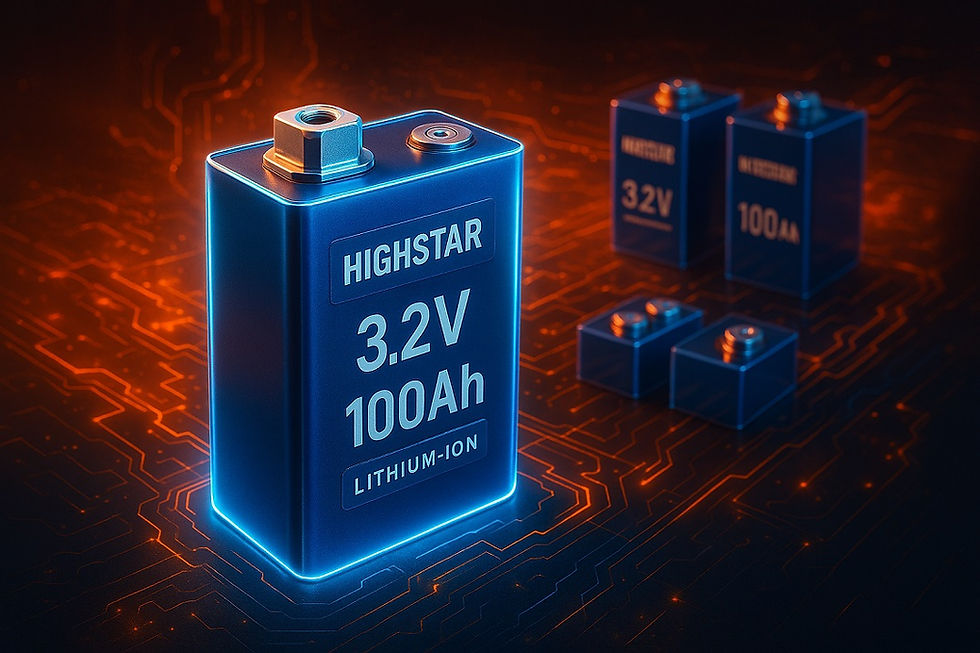Which Inverter Battery Should You Choose for Your Home?
- Miya Roy

- Jun 3, 2025
- 3 min read

In today’s fast-paced world, power outages can be more than just inconvenient—they can disrupt your daily routine and impact your comfort and productivity. That’s why investing in a reliable inverter battery is essential for every household. But with so many options available in the market, choosing the best inverter battery for your home can feel overwhelming. In this blog, we’ll walk you through the key types of inverter batteries, their pros and cons, and how to select the one that best suits your home’s energy needs.
Types of Inverter Batteries
Before diving into recommendations, it’s important to understand the three primary types of inverter batteries:
1. Lead-Acid Batteries
These are the most commonly used inverter batteries in Indian homes.
Pros:
Affordable
High power output
Widely available
Cons:
Requires regular maintenance (topping up with distilled water)
Shorter lifespan (3-5 years)
·Emission of gases during charging
Lead-acid batteries are a good choice for budget-conscious homeowners who don’t mind occasional maintenance.
2. Tubular Batteries
A subtype of lead-acid batteries, tubular batteries are known for their durability and higher efficiency.
Pros:
Long lifespan (up to 8 years)
Better performance during long power cuts
Requires less maintenance than flat plate lead-acid batteries
Cons:
More expensive than standard lead-acid batteries
Heavier and bulkier
If your area experiences frequent and prolonged power cuts, tubular batteries are often considered the best inverter battery for home use due to their reliability.
3. Lithium-ion Batteries
These are the most advanced inverter batteries currently available.
Pros:
Longest lifespan (up to 10 years or more)
Maintenance-free
Faster charging
Compact and lightweight
Eco-friendly and safe
Cons:
High initial cost
Limited availability in some areas
Lithium-ion batteries are ideal for modern, tech-savvy households looking for a long-term, hassle-free power backup solution. Though they come with a higher upfront cost, their superior performance and low maintenance needs make them a worthwhile investment in the long run.
Factors to Consider When Choosing an Inverter Battery
To identify the best inverter battery for your home, consider the following factors:
Power Requirement: Calculate your household’s energy consumption. Higher loads require higher capacity batteries.
Backup Duration: Determine how long you want your inverter to support power backup during an outage.
Battery Capacity: Measured in Ah (Ampere-hours), a higher capacity provides longer backup.
Budget: Balance initial cost with long-term savings. Lithium-ion batteries may cost more initially but offer better value over time.
Maintenance: If you prefer a low-maintenance lifestyle, opt for lithium or tubular batteries over flat-plate lead-acid batteries.
Space Constraints: Lithium-ion batteries are compact and ideal for homes with limited installation space.
Final Recommendation
For most urban homes with moderate to high power needs and a preference for minimal maintenance, lithium-ion batteries are increasingly becoming the best inverter battery for home use. Their efficiency, safety, and durability are hard to beat. However, for areas with frequent outages and budget limitations, tubular batteries offer a great balance between performance and cost.
A Word on Quality and Manufacturers
Regardless of the battery type you choose, always opt for products from reputed brands and manufacturers. Quality directly affects the battery’s lifespan, performance, and safety. Ensure that the battery is compatible with your inverter and comes with a solid warranty.
If you’re leaning towards lithium-ion batteries for their superior benefits, it’s wise to buy from trusted Lithium ion Battery Manufacturers in India. These manufacturers offer technologically advanced, BIS-certified solutions designed for Indian conditions, ensuring reliable backup and long-term savings.
Conclusion: Selecting the right inverter battery is crucial for ensuring an uninterrupted power supply in your home. Evaluate your needs, weigh the pros and cons of each type, and choose a battery that offers the best combination of performance, safety, and value. And if you’re ready to make a smart, future-proof choice—consider lithium batteries from leading Lithium-ion Battery Manufacturers in India.



Comments